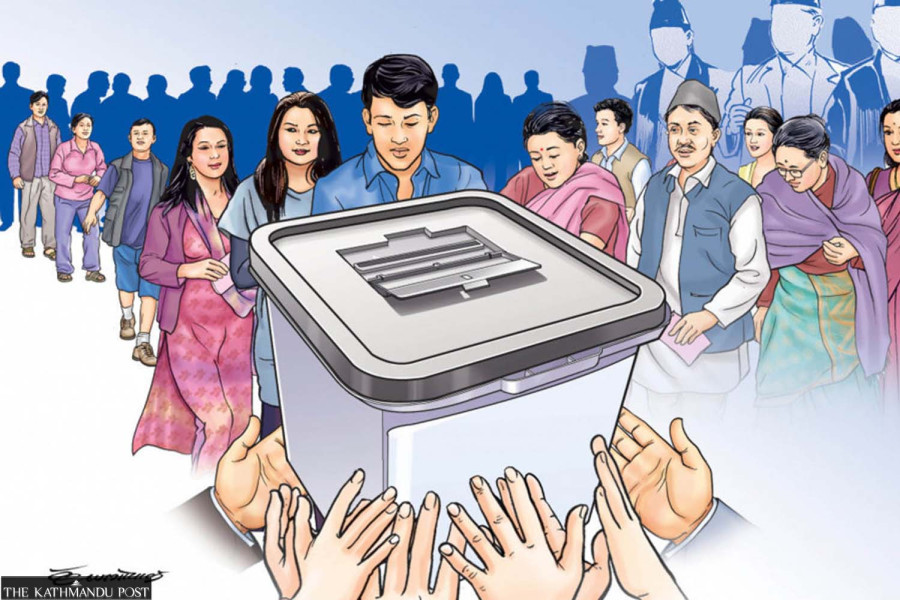Politics
What are new parties offering that traditional ones don’t?
Many have laid emphasis on effective implementation of constitution and shoring up federalism.
Nishan Khatiwada
With the emerging political parties hot to trot for the November polls, many are keeping a close eye on the planks they will contest the elections.
In the fray are as many as 2,412 first-past-the-post candidates from 62 political parties and independent aspirants.
As the elections draw closer, the major and emerging parties have begun working out strategies to boost their electoral prospects—agendas and priorities are the crucial parts of the strategies.
Leaders of the emerging parties echo each other saying they have prioritized better and viable agendas which the traditional parties have repeatedly ignored.
Some emerging parties also have free health care and free education as their common priority, while some have emphasised effective implementation of constitutional provisions.
Ganesh Karki, the press coordinator of the Rastriya Swatantra Party, which was formed by a group of independent candidates, says besides making other usual promises, they have given top priority to proper implementation of the fundamental rights enshrined in the constitution. “Our party is of the view that people should be able to enjoy the rights guaranteed by the constitution without any hindrance,” he said.
Likewise, amending the constitution with clearly demarcated the rights between the centre and provinces is also their priority, according to him. “We reckon the provincial structure should be active, easy and useful and the governance structure financially sustainable,” he said.
Television star Rabi Lamichhane, who has a huge fan following across the country, formed the party which has now fielded professionals in many constituencies and is seen as another prospective national party.
The state should control education and health—and make it free eventually, Karki added. “To sum up, our election agendas will discard the big promises the traditional parties failed to live up to and focus on the plans and agendas having a better prospect of practical implementation,” he told the Post. “The agendas that make a difference in public lives are our prime concern.”
The party, however, has not fielded any candidate for the provincial elections.
Sajha Party Nepal has fielded just one FPTP candidate. Under the proportional representation category, it has 27 candidates for the provincial elections. First of all, the federal structure should be allowed to function properly, as federalism is intrinsic to the constitution—if federalism fails then the constitution will also fail, says Milan Pandey, a leader of Sajha Party Nepal, who was formerly coordinator of the Bibeksheel Sajha Party. “We strongly believe that the provincial structure should be strengthened. If the chief ministers change repeatedly, that’s not the fault of the system, but of the political parties,” he told the Post.
Chandan Singh, general secretary of CK Raut-led Janamat Party, says they will solicit votes in the major polls with development and prosperity as their major planks.
According to him, the party’s priorities include resolving citizenship-related issues and farmers’ problems, along with subsidies and compensation for poor farmers and corruption-removal. “We will vocally advocate for a law giving voters the right to recall [allowing voters to remove elected representatives from office before their term has ended]. It will be our primary concern if we reach Parliament,” he said. “Moreover, we have also prioritised free health and education.”
Raut launched the Janamat Party on March 18, 2019 after giving up his extremist and secessionist agenda following an 11-point agreement with KP Sharma Oli-led government.
Singh says people will vote for his party, as it has emerged as a ray of hope in Madhesh, especially for the youths, especially since other Madheshi leaders have abandoned their core agendas and teamed up with traditional parties.
For the upcoming polls, the CPN-UML has already sealed an electoral deal with the Janata Samajbadi Party Nepal—a major Madhesh-based party. Likewise, the pro-monarchy Rastriya Prajatantra Party has formed poll alliances with the UML in some constituencies.
Similarly, the Nepali Congress-led alliance has the Maoist Centre, the Unified Socialist, Lotantrik Samajbadi Party, and the Rastriya Janamorcha as partners.
Samikchya Baskota, Bibeksheel Sajha Party chair, says ensuring Nepalis abroad have the right to vote will be their major election agenda—they firmly believe a law should be made on the basis of the Supreme Court verdict for the same.
The party has prioritised four ‘helping pillars’ for a sustainable economy—technology, hydroelectricity, agriculture, and tourism, according to her. “We will also advocate for jobs for prisoners. The plan is to reopen several state-owned factories that have remained shut for years and employ the prisoners under strict supervision.”
Nepal will vote on November 20 to elect 165 lawmakers through direct elections and 110 through the proportional representation system.
UML has fielded candidates in 141 constituencies, followed by Rastriya Prajatantra Party with 140 candidates.
Likewise, the Rastriya Swatantra Party stands third in fielding candidates—it is contesting in 131 constituencies. The Nepali Congress has 91 candidates, and the Janata Samajbadi Party has fielded candidates in 79 constituencies.
“Full implementation of the constitutional provisions and delivery of real socialism will be our major election agenda,” says Hamro Nepali Party chair Anant Raj Ghimire.
“Our other priority is job-creation to prevent youths from going abroad,” he told the Post. According to Ghimire, the party will advocate making the bodies such as the Supreme Court, Commission for the Investigation of the Abuse of Authority, and Election Commission—which are currently headed by people with political leanings—fairer and more independent.
They have fielded 65 candidates in federal constituencies and 101 in provincial ones, Ghimire said.




 18.12°C Kathmandu
18.12°C Kathmandu















